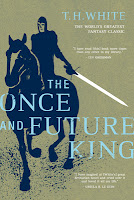
Poetry became better for me when I stopped having it as assigned reading. And when I'm not feeling self-conscious, and I read it out loud, then I'm doing it right.
You don't have to get the book-CD version of
A Coney Island of the Mind. But hearing Ferlinghetti read these will be a treat. Here's one:
Christ Climbed Down
By Lawrence Ferlinghetti
CHRIST climbed down
from His bare Tree
this year
and ran away to where
there were no rootless Christmas trees
hung with candycanes and breakable stars
Christ climbed down
from His bare Tree
this year
and ran away to where
there were no gilded Christmas trees
and no tinsel Christmas trees
and no tinfoil Christmas trees
and no pink plastic Christmas trees
and no gold Christmas trees
and no black Christmas trees
and no powderblue Christmas trees
hung with electric candles
and encircled by tin electric trains
and clever cornball relatives
Christ climbed down
from His bare Tree
this year
and ran away to where
no intrepid Bible salesmen
covered the territory
in two-tone cadillacs
and where no Sears Roebuck creches
complete with plastic babe in manger
arrived by parcel post
the babe by special delivery
and where no televised Wise Men
praised the Lord Calvert Whiskey
Christ climbed down
from His bare Tree
this year
and ran away to where
no fat handshaking stranger
in a red flannel suit
and a fake white beard
went around passing himself off
as some sort of North Pole saint
crossing the desert to Bethlehem
Pennsylvania
in a Volkswagon sled
drawn by rollicking Adirondack reindeer
with German names
and bearing sacks of Humble Gifts
from Saks Fifth Avenue
for everybody's imagined Christ child
Christ climbed down
from His bare Tree
this year
and ran away to where
no Bing Crosby carollers
groaned of a tight Christmas
and where no Radio City angels
iceskated wingless
thru a winter wonderland
into a jinglebell heaven
daily at 8:30
with Midnight Mass matinees
Christ climbed down
from His bare Tree
this year
and softly stole away into
some anonymous Mary's womb again
where in the darkest night
of everybody's anonymous soul
He awaits again
an unimaginable and impossibly
Immaculate Reconception
the very craziest
of Second Comings
 A startling, wonderful novel about the true meaning of being an alien in an equally alien world.
A startling, wonderful novel about the true meaning of being an alien in an equally alien world.










